Over 450,000 migrants have fled Pakistan for Afghanistan amid a worsening rift between the two governments. This wave of migration comes after the passing of the Pakistani government’s November 1st deadline for undocumented migrants to leave the country or face deportation. Pakistan’s policy has sparked significant humanitarian concerns, as well as an increase in tensions between Afghanistan and Pakistan. All the while, the 1.4 million undocumented Afghans in Pakistan face an uncertain, potentially dangerous future.
With winter fast approaching, the United Nations High Commission for Refugees (UNHCR) has urged Pakistan to halt deportations until spring, as the brutal Afghan winter can be deadly for those in transit. Despite the pleas of the UN and other organizations, Pakistan continues to embark on its deportation strategy, with police searching door to door in residential neighborhoods throughout Pakistan to find undocumented Afghans. On the other side of the border, Afghanistan faces numerous economic challenges which will hamper its ability to accommodate the sudden influx of people fleeing Pakistan. Many of the migrants have expressed grave concerns about their future in Afghanistan. In particular, those who worked for the U.S. and the former Afghan government are at risk of retribution by the Taliban, the militant group that governs the country. Women and minorities, particularly members of the LGBTQ community and Hazara Shiites, are at risk of discrimination upon return to Afghanistan.
Many of the refugees at risk of harm upon return to Afghanistan have applied for legal residency in third world countries and are simply using Pakistan as a transit point while awaiting clearance to move to their final destination. Although Pakistan originally set a deadline for the end of the year for this category of refugees to leave the nation, Pakistani authorities extended this deadline until February 29th, 2024. Anyone who stays beyond this deadline will face a fine of $100 per month, with a maximum of $800.
While Pakistani officials have stated that none of the 1.4 million Afghans registered as refugees will be deported and no migrant will be mistreated in the deportation process, there are concerns that this is not the case. Abdul, an Afghan man who has spent his entire life in Pakistan, told the UNHCR that those with official refugee status still face pressure from law enforcement to leave Pakistan. Abdul is not the only refugee who faced pressure to leave, with the UN having received many reports detailing similar scenarios.
Speaking to the UN, Assadullah, a man who had spent 44 years in the Pakistani city of Quetta following his family’s decision to flee from Afghanistan following the 1979 Soviet invasion, expressed a sentiment of despair: “Recently, we felt so much harassment. They were searching our homes, arresting us on the streets, taking our money and not accepting our refugee cards. We thought things would improve, but they got worse day by day.”
This pressure impacted Abdul’s decision to flee Afghanistan with his wife and child a day before the November 1st deadline for migrants to leave the country. In just a few hours, Abdul had gone from a condition of stable employment to having to completely start over in a country he had never lived in. Once he arrived in Afghanistan, he received essential services and a cash grant from the UNHCR; however, he still faces an uncertain future. Due to a government-imposed restriction on migrants leaving Pakistan with cash, those returning to Afghanistan may only do so with a maximum of 50,000 rupees (U.S. $173). Most returning migrants will essentially be starting over, a fact which will lead to many facing serious economic challenges in a country which already faces a rapidly rising unemployment rate and rampant food insecurity.
Still, with little other choice available to them, nearly half a million Afghans have already left, choosing not to wait for police crackdowns. Many more are expected to leave in the coming weeks and months. A tragic result of this policy is the separation of families, often happening when one parent is a legal resident of Pakistan while the other is not. Baz Gul, an Afghan man who was born and raised in Karachi as the son of refugees, faces this exact scenario, as he was deported following a Pakistani raid on Afghan migrants. As he faces the reality of transitioning to life in Afghanistan, his pregnant wife and 10-year-old son are stuck in Pakistan, separated from their husband and father and forced to rely on other family members for financial support.
The fate of Baz Gul and his family is shared by hundreds of others. As migrants pour into Afghanistan, they must adapt to an unfamiliar country with limited economic opportunities and a repressive government. The Taliban has set up two camps along the border with Pakistan to provide services to migrants and to assist with transferring them back to their native villages and cities. However, the Taliban does not have the resources to effectively manage the waves of migrants pouring in.
The Pakistani government claims that security and crime are the reasons for these deportations, arguing that undocumented Afghans are responsible for terrorism, smuggling, and petty crimes. Sarfraz Bugti, Pakistan’s interim Interior Minister, claimed in October that 14 out of the 24 suicide attacks which occured in Pakistan in 2023 were committed by Afghan nationals. The Pakistani state has argued that mass deportations will alleviate these issues, especially terrorism. However, as many analysts note, the deportations are also likely an attempt to pressure Afghanistan into taking a stronger stance against cross-border terrorist organizations.
Tensions have risen between the two countries following the Taliban’s return to power in 2021. Hundreds of thousands of Afghan migrants have made their way to Pakistan, often fleeing persecution and a worsening Afghan economy. Pakistan’s move to deport migrants comes after several failed efforts to constrain the Taliban-backed terrorist organization Tehrik-i-Taliban Pakistan (TTP), which has created a major strain on relations between Afghanistan and Pakistan following the Taliban’s takeover. Pakistan’s previous attempts to pressure the Taliban government, such as trade restrictions, have been unsuccessful. With terrorist attacks on the rise in Pakistan, and an increasingly unreliable government in Kabul, it is likely that Pakistani policymakers view deportations as a way to pressure the Taliban into adopting a more strict policy on the TTP. The fact that the Taliban cannot adequately handle an influx of migrants is well known to Pakistani policymakers, who view the deportations as a tool to be used to pressure the Afghan government to clamp down on the TTP.
The Afghan government has expressed displeasure with Pakistan’s policy, while asserting that they will support the migrants to the best of their abilities. Ultimately, Pakistan’s move will serve to worsen an already strained relationship between Afghanistan and Pakistan. In mid-November, Afghanistan’s acting commerce minister, Haji Nooruddin Azizi, visited Islamabad to discuss issues pertaining to refugees. In a statement released by the Afghan embassy in Islamabad, the Taliban stated that “bilateral trade, especially the stranded goods of [Afghan] traders in Karachi port, smooth transfer of [Afghan] refugees’ properties to [Afghanistan] and related issues were discussed.”
Despite the discussion of easing the treatment of Afghan migrants and breaking down economic barriers, the Pakistani government maintains that effective regional cooperation on counterterrorism is a necessary precursor to economic reforms which favor Afghans, while the Taliban maintains that terrorism is an internal Pakistani problem rather than a cross-border phenomenon. As both governments continue to have no ability to see eye to eye on these issues, their relationship will likely continue to deteriorate, with both sides blaming the other for the recent downturn in relations. The lack of trust between the two countries represents a Pakistani foreign policy failure, given that Pakistan supported the Taliban’s return to power with the assumption that their government would be more friendly than the previous U.S.-backed regime.
With both sides showing no signs of backing down, it is likely that tensions will remain high, and migrants will continue to pour into Afghanistan. Pakistan’s actions will lead to numerous humanitarian consequences, particularly with respect to those who are likely to face discrimination upon return to Afghanistan. The international community can assist Afghanistan by offering services to migrants and aiding with resettlement. However, the Taliban’s unrecognized governance, history of terrorism, and support for terrorist organizations represent major roadblocks to international assistance. Meanwhile, the Taliban will continue providing a safe haven to the TTP, and Pakistan will continue to respond through rash deportation policies. As a result, through no fault of their own, migrants will continue to be separated from their families and livelihoods as they are forced to flee to Afghanistan.
Feature Image Source: EFE






Comments are closed.